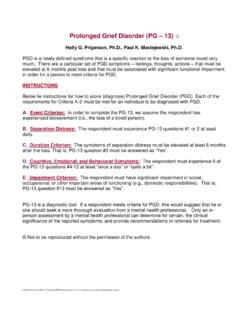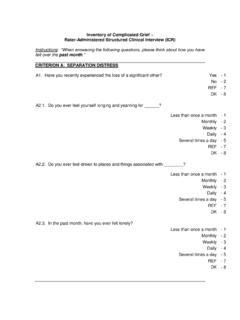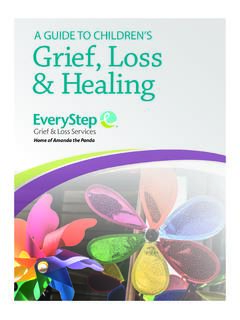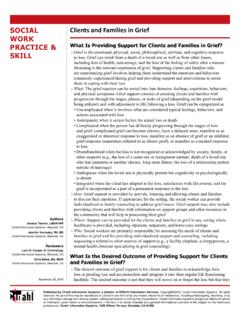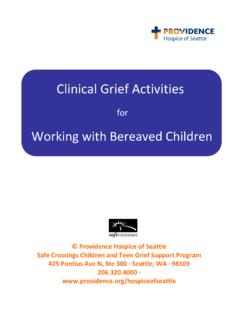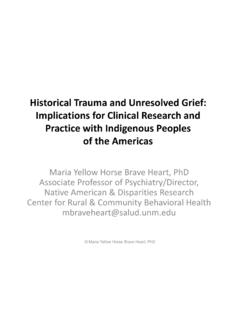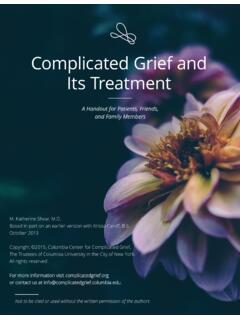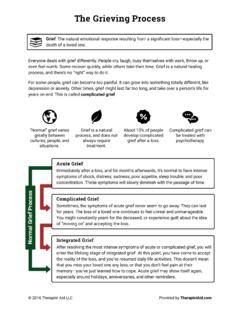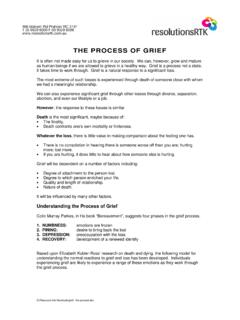Transcription of Inventory of Complicated Grief: A scale to measure ...
1 ELSEVIER Psychiatry Research 59 (1995) 65-79 PSYCHIATRY RESEARCH Inventory of Complicated grief : A scale to measure maladaptive symptoms of loss Holly G. Prigerson*a, Paul K. Mac j le ewskib, Charles F. Reynolds IIIa, Andrew J. Bierhals , Jason T. Newsomc, Amy Fasiczkaa, Ellen Franka, Jack Domana, Mark Millera aMental Health Clinical Research Center for Late-Life Mood Disorders, Bellefield Towers, Room 754, Western Psychiatric Institute and Clinic, 3811 O Hara Street, Pittsburgh, PA 15213-2593, USA bDepartment of Mechanical Engineering, University of Pittsburgh, 3700 O Hara Street, Pittsburgh, PA 15261, USA University Center for Social and Urban Research, University of Pittsburgh, 121 University Place.
2 Pittsburgh, PA 15260, USA Received 2 December 1994; revision received 14 July 1995; accepted 8 August 1995 Abstract Certain symptoms of grief have been shown (a) to be distinct from bereavement-related depression and anxiety, and (b) to predict long-term functional impairments. We termed these symptoms of Complicated grief and developed the Inventory of Complicated grief (KG) to assess them. Data were derived from 97 conjugally bereaved elders who com- pleted the ICG, along with other self-report scales measuring grief , depression, and background characteristics. Ex- ploratory factor analyses indicated that the KG measured a single underlying construct of Complicated grief .
3 High internal consistency and test-retest reliabilities were evidence of the ICG s reliability. The KG total score s association with severity of depressive symptoms and a general measure of grief suggested a valid, yet distinct, assessment of emo- tional distress. Respondents with ICG scores >25 were significantly more impaired in social, general, mental, and physical health functioning and in bodily pain than those with ICG scores ~25. Thus, the ICG, a scale with demonstrated internal consistency, and convergent and criterion validity, provides an easily administered assessment for symptoms of Complicated grief .
4 Keywords: Depression; Bereavement; Factor analysis 1. Introduction Conjugal bereavement is one of the more com- mon misfortunes besetting those who survive to old age. While of men over the age of 65 are l Corresponding author, Tel: +I 412 624-5554; Fax: +l 412 624-2841; E-mail: widowers, nearly half of all women 265 years of age are widows. Among those who survive 185 years, 8 of women, compared with of men, are widowed ( Bureau of the Census, 1993). Not only is widowhood among the most fre- quently encountered of all life events (Stroebe and Stroebe, 1993), but bereavement is consistently described as being among the most stressful ( , 0165-1781/95/% 0 1995 Elsevier Science Ireland Ltd.)
5 All rights reserved SSDI 0165-1781(95)02757-N 66 Prigerson et al. /Psychiatry Research 59 (19951 65-79 Holmes and Rahe, 1967; Osterweis et al., 1984; Irwin and Weiner, 1987; Shuchter and Zisook, 1987; Stroebe and Stroebe, 1993). Given the stress associated with widowhood, particularly when accompanied by the multiple losses encountered in late life, it is not surprising that bereavement greatly increases an individual s risk of exhibiting depressive symptoms, if not a major depressive episode (Lund et al., 1985; Brown and Harris, 1989; Bruce et al., 1990; Clayton, 1990; Zisook and Shuchter, 1993).
6 Aside from other forms of emotional disturbance, such as anxiety (Bornstein et al., 1973; Parkes and Weiss, 1983; Jacobs et al., 1990) widowhood has also been shown to be a risk factor for impaired immune function ( , natural killer cell activity: Irwin et al., 1987), more physician visits (Mor et al., 1986), poorer physical health (Helsing and Szklo, 198 1; Arens, 1982-83; Reissman and Gerstel, 1985; Kaprio et al., 1987) suicide (Kaprio et al., 1987), and mortality (Kraus and Lilienfeld, 1959; Jones, 1987; Smith, 1990). Still, the morbidity and mortality secondary to bereavement-related emotional distress has not been the topic of systematic investigation.
7 More specifically, with the exception of our own prelimi- nary reports (Prigerson et al., 1995a, 1995b), the long-term complications associated with symp- toms of grief have not been studied. In the absence of research on the consequences associated with symptoms of grief , the distinction between normal and more pathological forms of grief cannot be made. A major impediment to the study of the risk fac- tors for, the prevalance of, and the outcomes associated with certain symptoms of grief has been the absence of a scale to assess symptoms of com- plicated grief , by which we mean the symptoms that we would expect, based on clinical experience and empirical study, to find associated with long- term functional impairments.
8 Below we describe why our earlier work suggested the need to develop such a scale . Our recent research among conjugally bereaved elders has shown that certain symptoms of grief form a unified component of emotional distress that is clearly distinguishable from the symptoms of depression and anxiety (Prigerson et al., 1995a. 1995b). Such symptoms as irritability, nervous- ness, tenseness, and restlessness were best characterized as symptoms of anxiety, while those of sad mood, apathy, and guilt were best characterized as symptoms of depression. A third group of symptoms, however, appeared to con- stitute a uniquely grief -specific profile: preoccupa- tion with thoughts of the deceased, searching and yearning for the deceased, disbelief about the death, crying.
9 Being stunned by the death, and not accepting the death. In addition to the fact that they formed a distinct cluster of symptoms, the above symptoms of grief were found to predict long-term dysfunc- tion. In one study, mean baseline levels of grief - related symptoms (after adjustment for baseline levels of depressive symptoms) were found to pre- dict impairments of global functioning, sleep, mood, and self-esteem at 18 months after spousal loss (Prigerson et al., 1995b). In another study, the chosen symptoms of grief were found to predict both grief and depressive symptomatology at 12- and 18-months after spousal loss, again after ad- justment for baseline levels of depression (Priger- son et al.)
10 , 1995a). In these two studies, subjects who had met criteria for a major depressive epi- sode were treated with the antidepressant nortrip- tyline. As further evidence of the distinctiveness of grief and the need for grief -specific treatment, we found that subjects who had received nortriptyline declined significantly in their levels of depressive and anxiety-related symptomatology, but they did not have significantly greater resolution of their grief -related symptomatology over time than did untreated subjects. The results of these two studies and those of others suggest that certain symptoms of grief , left untreated or even when treated with nortriptyline, tend to persist (Faschingbauer et al.
